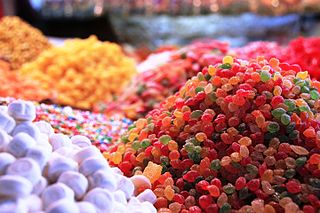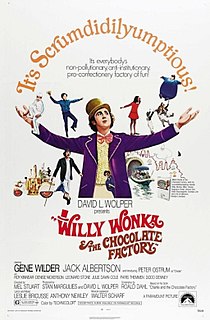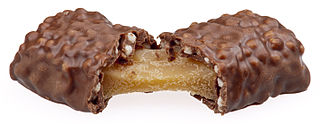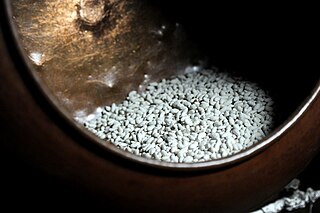Fuse or FUSE may refer to:

Candy, also called sweets or lollies, is a confection that features sugar as a principal ingredient. The category, called sugar confectionery, encompasses any sweet confection, including chocolate, chewing gum, and sugar candy. Vegetables, fruit, or nuts which have been glazed and coated with sugar are said to be candied.

A chocolate bar or candy bar is a confection containing chocolate, which may also contain layerings or mixtures that include nuts, fruit, caramel, nougat, and wafers. A wide variety of chocolate bar brands are sold. A popular example is a Snickers bar, which consists of nougat mixed with caramel and peanuts, covered in milk chocolate.

Willy Wonka & the Chocolate Factory is a 1971 American musical fantasy film directed by Mel Stuart and starring Gene Wilder as Willy Wonka. It is an adaptation of the 1964 novel Charlie and the Chocolate Factory by Roald Dahl. The film tells the story of a poor child named Charlie Bucket who, after finding a Golden Ticket in a chocolate bar, visits Willy Wonka's chocolate factory along with four other children from around the world.

Mars, commonly known as Mars bar, is the name of two varieties of chocolate bar produced by Mars, Incorporated. It was first manufactured in 1932 in Slough, England by Forrest Mars, Sr. In its British version the bar consists of caramel and nougat coated with milk chocolate. An American version of the Mars bar was produced which had nougat and toasted almonds covered in milk chocolate; later, caramel was added to the recipe as well. The American version was discontinued in 2002, then revived in a slightly different form the following year under the name "Snickers Almond".
3 Musketeers is a candy bar made in the United States and Canada by Mars, Incorporated. It is a candy bar consisting of chocolate-covered, fluffy, whipped mousse. It is a lighter chocolate bar similar to the global Milky Way bar and similar to the American version Milky Way bar only smaller and minus the caramel topping. The 3 Musketeers Bar was the third brand produced and manufactured by M&M/Mars, introduced in 1932. Originally, it had three pieces in one package, flavored chocolate, strawberry and vanilla; hence the name, which was derived from the 1844 novel The Three Musketeers by Alexandre Dumas. Rising costs and wartime restrictions on sugar saw the phasing out of the vanilla and strawberry pieces to leave only the more popular chocolate. Costing five cents when it was introduced, it was marketed as one of the largest chocolate bars available, one that could be shared by friends.
Butterfinger is a candy bar manufactured by the Ferrero SpA, a subsidiary of Ferrero. It consists of a layered crisp peanut butter core covered in chocolate.
Crunchie is a brand of chocolate bar with a honeycomb toffee sugar centre. It is made by Cadbury and was originally launched in the UK by J. S. Fry & Sons in 1929.

100 Grand is a candy bar produced by the Ferrara Candy Company, a subsidiary of Ferrero. The candy bar was created in 1964. It weighs 1.5 ounces (43 g) and includes chocolate, caramel and crisped rice. The bar contains 201 calories; it is low in cholesterol and sodium, but high in saturated fat and sugar. Its first slogan was, "Tastes so good it's almost illegal!" Its current slogan is, "That's Rich!"

Nestlé Milk Chocolate was a chocolate bar consisting of milk chocolate, produced by Nestlé. Nestlé Milk Chocolate was sold in many countries around the world, including the United States and Canada. It has now been discontinued by Nestlé.
"Band Candy" is the sixth episode of season three of the television show Buffy the Vampire Slayer. It was written by Jane Espenson, directed by Michael Lange, and first broadcast on November 10, 1998.
"The Candy Man" is a song that originally appeared in the 1971 film Willy Wonka & the Chocolate Factory. It was written by Leslie Bricusse and Anthony Newley specifically for the film. Although the original 1964 book by Roald Dahl contains lyrics adapted for other songs in the film, the lyrics to "The Candy Man" do not appear in the book. The soundtrack version of the song was sung by Aubrey Woods, who played Bill the candy store owner in the film.
Charleston Chew is a candy bar consisting of flavored nougat covered in chocolate flavor coating. It was created in 1925 by the Fox-Cross Candy Company, founded by stage actor Donley Cross and his friend Charlie Fox. The candy was named after the Charleston, a popular dance at that time.
Bonbon refers to any of several types of sweets, especially small candies enrobed in chocolate.

Candy making or candymaking is the preparation and cookery of candies and sugar confections. Candy making includes the preparation of many various candies, such as hard candies, jelly beans, gumdrops, taffy, liquorice, cotton candy, chocolates and chocolate truffles, dragées, fudge, caramel candy, and toffee.






